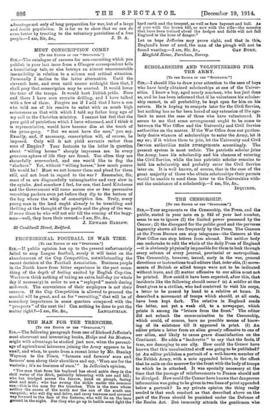THE MAN FOR THE TRENCHES.
[To THE EDITOR OF THE "SFECTATOR."]
SIR,—The following paragraph from one of Richard Jefferies's most observant and interesting books, Hodge and his Masters, might with advantage be studied just now, when the percent- age of agricultural labourers joining the Army appears to be small, and when, to quote from a recent letter by Mr. Stanley Weyman to the Times, "farmers and farmers' sons and farmers' men shrug their shoulders and say, 'Wars are for the wastrels ; it's no business of ours:" In Jefferies's opinion, "The man that from his boyhood has stood ankle deep in the ehill water of the ditch, patiently labouring with axe and bill; who has trudged across the furrow, hand on plough, facing sleet and mist; who has swung the sickle under the summer sun—this is the man for the trenches. This is the man whom neither the snows of the north nor the sun of the south can vanquish ; who will dig and delve, and carry traverse and covered way forward in the face of the fortress, who will lie on the bare ground in the night. For they who go up to battle must fight the hard earth and the tempest, as well as face bayonet and ball. As of yore with the brown bill, so now with the rifle—the muscles that have been trained about the hedges and fields will not fail England in the hour of danger."
Let us hope Jefferies may prove right, and that in this, England's hour of need, the man of the plough will not be






































 Previous page
Previous page